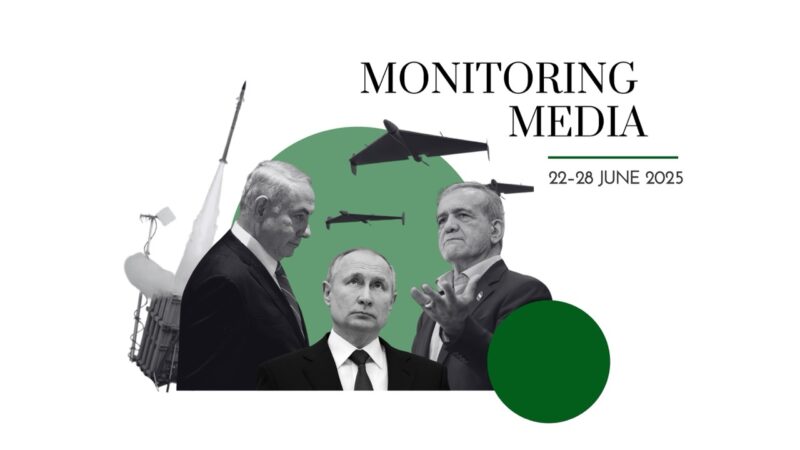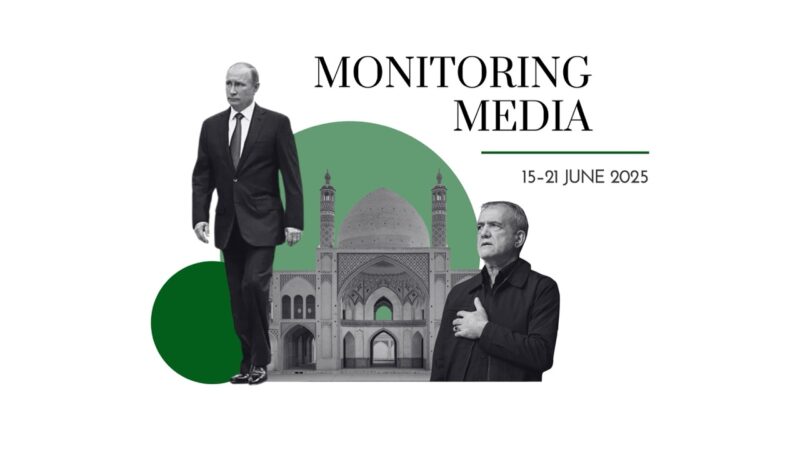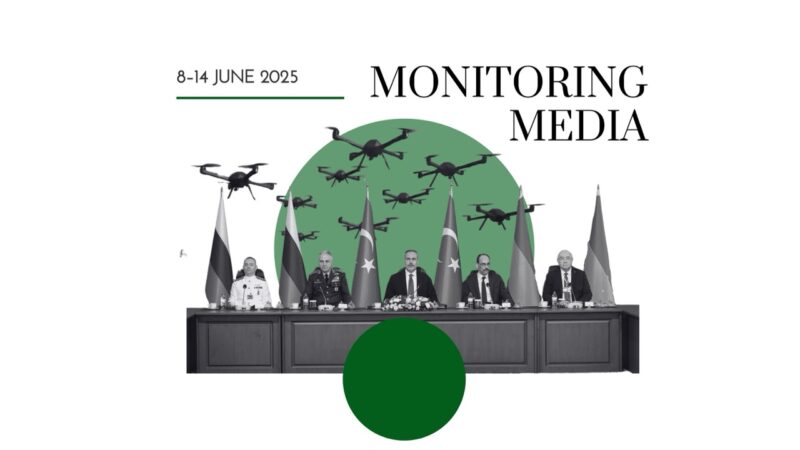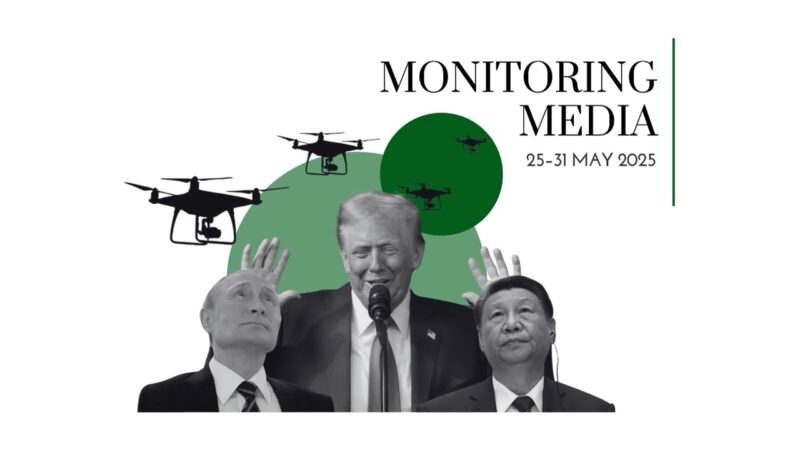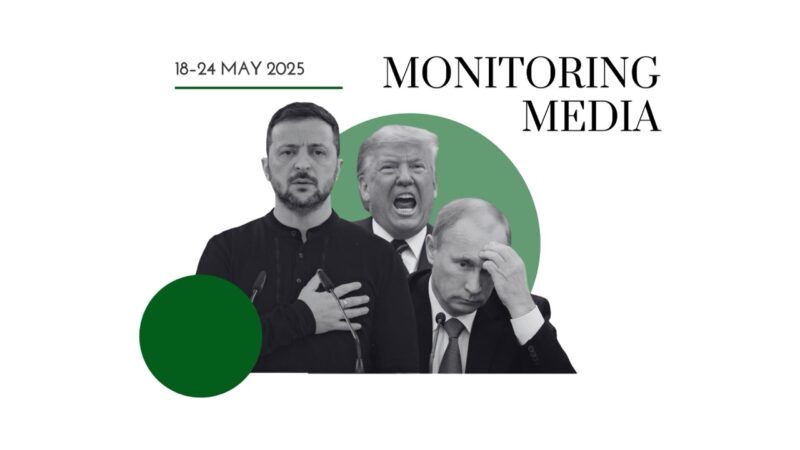Implications of elections in Russia for Ukraine and the world

CIUS weekly report on North American media coverage of Ukrainian affairs, 26 November–2 December 2023
Five publications (Foreign Policy, Foreign Affairs, The Wall Street Journal, The Economist, and The Globe and Mail) were selected to prepare this report on how Ukraine has been portrayed in the North American press during the past week. The sample was compiled based on their impact on public opinion as well as on their professional reputation, popularity among the readership, and topical relevance. These publications represent centrist viewpoints on the political spectrum.
This report covers only the most-read and relevant articles about Ukraine, as ranked by the respective North American publications themselves in the past week. Its scope covers promoted articles on home pages and articles from special sections on Ukraine, with the hashtag #Ukraine, from the paper editions of the publications, and about Ukraine from opinion columns and editorials.
Topics featured in the selected articles:
- The world and Ukraine: potential consequences of freezing Russian assets; necessary steps by the West to ensure Ukraine’s victory; Ukraine and the West have only one option: win or lose.
- Russia at war: Russia’s elections will confirm autocracy and permanent conflict with the West.
Main arguments:
What you need to know about the seizure of Russian assets. Agathe Demarais (Foreign Policy) opines that using Russian money for Ukraine recovery seems attractive but has serious consequences. Since the beginning of Russia’s war against Ukraine, there have been discussions in the pundit community about whether Western governments should confiscate some of the reserves of Russian central banks that are deposited in the West. The key question is whether they should be handed over to Kyiv. Both supporters and opponents of such a step emphasize the moral and legal components of this issue. However, according to Demarais, this obscures the broader picture: “Seizing Russian central bank reserves comes with economic, financial, and geopolitical implications that need to be taken into account to reach a balanced decision on this tricky debate.” It is worth noting ten key factors associated with such a decision. First, seizure of Russian central bank reserves does not constitute a sanction; sanctions against Moscow are designed to weaken Russia’s ability to wage war, although the seizure of Russian assets is a punitive step against Moscow. Second, confiscation of Russia’s assets would not make a big financial difference for the Kremlin; instead, these assets could be used over time as part of Russia’s reparations to Ukraine. Third, seizure of Russian assets is unlikely to fuel global de-dollarization efforts; the argument of those opposed to the seizure of Russia’s reserves that such a step would accelerate the attempts of emerging economies to move away from Western currencies is only partially true. Fourth, the transfer of Russian reserves would require cooperation with Euroclear: “Three-quarters of these assets are held by Euroclear, a Belgian company that acts as a trusted depository for global securities.” Fifth, the use of Western financial channels such as Euroclear fuels financial fragmentation. Sixth, financial fragmentation undermines the long-term effectiveness of Western sanctions, as the emergence of alternative financial mechanisms may weaken their effectiveness. Seventh, receiving Russia’s reserves could be a double-edged sword for Kyiv: on the one hand, this money will help finance Ukraine’s war efforts, while on the other hand, it would be easier for opponents of aid to Kyiv in the US to appeal to the inexpediency of further financial support for Ukraine, and Kyiv would not be able to use these assets as “as a bargaining chip in peace negotiations.” Eighth, seizure of Russia’s reserves risks fueling resentment against Western powers. Ninth, seizure of Russia’s assets may increase the perception of double standards. Finally, Confiscating Moscow’s reserves could set a precedent that China or others could use. According to Demarais, “Perhaps the moral arguments in favor of seizing these assets outweigh the consequences. Acknowledging these impacts, however, is the first step towards reaching a balanced conclusion in this thorny debate.”
What is the West willing to do for Ukraine’s victory? Marcus Walker (Wall Street Journal) argues that after almost two years of Russia’s full-scale war against Ukraine, Moscow has the upper hand on the military, political, and economic fronts. This dynamic is driven by Russia’s determination and its allied autocratic regimes to accumulate significant resources to win, while Western countries are unable to cope with their messes at home. Moscow has reoriented its economy to military needs, stabilized its internal political process, and increased pressure on the battlefield, having far larger human resources than Ukraine. However, according to Walker, regardless the Russian army has significant limitations in its offensive: “on display in the grueling fight for the city of Avdiivka—suggest it is more likely to grind out [only] small gains than to achieve a breakthrough.” In order for Ukraine to win, it is important to make the right choices next year in terms of Ukraine’s approach and Western resourcing. So far, Western allies have been unable to properly use their resources and technical superiority: “The U.S., European Union, and U.K. have a combined annual economic output of about $45 trillion—20 times the size of Russia’s economy—and superior technology.” Meanwhile, political gamesmanship in the EU and political paralysis in the U.S. are “threatening the supply of arms and money that Ukrainian survival depends on.” While Russia has been building up its armaments, in particular by increasing the production of small battlefield drones, Western countries have been unable to fulfill their commitments: “The West has implemented only limited steps to boost military production. The U.S. is increasing its output of artillery shells, but EU countries are failing to coordinate to place orders and motivate investment in new defense production.” Moreover, Russia continues to receive systematic assistance from its allies: “The EU promised Ukraine a million artillery shells by next March, but officials say the bloc will fall far short. In contrast, North Korea provided Russia with a million shells in a short time this fall.” Therefore, in the author’s opinion, if the West’s approach to supporting Kyiv does not change, next year could be extremely difficult for Ukraine.
Choosing to win or lose. Nona Mikhelidze and Nathalie Tocci (Foreign Policy) argue that notwithstanding Kyiv’s significant successes in the Black Sea, the dynamic on the battlefield allows Moscow to reinforce its narrative of disrupting the Ukrainian counteroffensive and strengthening its own foothold near Avdiivka and Vuhledar. Despite the significant losses of Russian manpower in recent months and the low strategic value of Russia’s small territorial gains, this step is justified from Moscow’s point of view: “They give many observers the impression that the military initiative is back in Moscow’s hands. Alongside the lacklustre Ukrainian counteroffensive, the fear that the tables are turning in Russia’s favour is adding to the war fatigue among Western nations and eliciting calls for negotiations.” According to Mikhelidze and Tocci, states in the West have indeed reached the limits of its current strategy: “In practice, if not in words, this strategy has centred on ensuring Ukraine’s survival without enabling it to achieve a decisive victory.” That is why Ukraine’s Western sympathizers are at a crossroads: either continue the war with a significant risk of losing to Russia or start negotiations that will lead to a territorial compromise. However, these thoughts are meaningless, as neither Ukraine nor Russia are ready for negotiations. Ukrainians are not ready to make concessions at the expense of their own territories and citizens, and President Putin has no benefit from ending the war. For his regime, the war has become a tool for maintaining power. That is why, according to the authors, “The choice facing the West is not between war and compromise but between defeat and victory.”
Russia’s elections will affirm autocracy and permanent conflict with the West. Andrei Kolesnikov (Foreign Affairs) emphasizes that the Kremlin needs presidential elections “to give legitimacy to [Putin’s] eternal rule—and to his unending war.” Therefore, despite the public proposals of the Russian president’s supporters to cancel the elections, the Kremlin is interested in holding them. According to Kolesnikov, “the March vote should be thought of as a kind of acclamation for the leader: they are simply voting yes to the only real choice available.” However, Russia’s war against Ukraine has implications for the March elections. New rules of the game have emerged that satisfy both the Kremlin and the citizens: “In exchange for keeping most of them out of the trenches, the passive majority of Russians will continue to support the government.” However, there are no guarantees that the Kremlin will keep its end of the bargain. The citizens explained that they are surrounded by enemies in this war not only with Ukraine, but also with the West, and therefore “they must give full support to their commander to repel both the enemy at the gates and the traitors and foreign agents within.” On the one hand, support for the military remains high in Russian society, while polls show that just over half of respondents are in favour of starting peace talks. However, since the country has suffered significant losses in Russia’s war against Ukraine, most of those who support a settlement would like to get something in return: “Russia should keep the ‘new’ territories it has conquered or ‘restored’ to Moscow.” Russia’s war against Ukraine has turned into an “existential rematch with the West”, where Ukraine is part of a long, historically significant clash of civilizations. To support this mythologized picture of the world, the Kremlin needs a viable economic model. And in this regard, Moscow has serious miscalculations. In the current situation, the Kremlin can only offer the same survival model that has become standard since the full-scale invasion: “to live against the backdrop of war without paying attention to it and wait for ‘victory’ in whatever form the president someday chooses.”
Maintaining optimism in Ukraine is an ever-greater challenge. Mark MacKinnon (Globe and Mail) paints a grim picture of Ukraine’s battle prospects as winter looms: “A months-long Ukrainian counteroffensive that many had hoped would break through Russian defences has effectively ended after liberating only a few small villages. Now it’s the Russian army that’s again grinding forward.” President Zelensky, he writes, was once optimistic but now faces a more pessimistic mood in the country, with military setbacks creating cracks in Ukraine’s united front. The most dangerous divide appeared earlier in November, when Zelensky chastised Ukraine’s top military commander following Zaluzhnyi’s sobering op-ed on the state of the war for The Economist. Mykhailo Podolyak, advisor to the Chief of Staff in the Office of the President of Ukraine, who was interviewed by the author, believes that “the focus on the supposed divide between Mr. Zelensky and Gen. Zaluzhny worked in Moscow’s favour by creating concern among Ukraine’s Western allies about the country’s leadership and its ability to win the war.” MacKinnon points out that promoting optimism in Ukraine in the winter of 2023 is a more challenging task than it was in the spring of 2022. During that time, Zelensky earned widespread credit for inspiring the country to engage in a war, previously deemed unwinnable, through his resolute nightly speeches. Surveys indicate that while Zelensky remains the nation’s most trusted politician, trust in the president is gradually diminishing. According to an October study by the Kyiv International Institute of Sociology (KIIS), 76 percent of respondents expressed belief in the president, a decline from 91 percent in May 2022—with a significant portion of the decrease observed in the past six months. According to polls conducted by KIIS, the majority of Ukrainians (80 percent) express readiness for an extended war, indicating a preference to continue fighting rather than entering into a peace agreement with Russia that would include territorial concessions.
The West urgently needs to mobilize support for Ukraine. The editorial board of the Economist argues in their op-ed that Russian dictator Vladimir Putin undermines the conviction in the West “that Ukraine can—and must—emerge from the war as a thriving European democracy.” Putin’s potential for success in the ongoing war with Ukraine is growing due to its war of attrition, military supplies procured abroad, and strategic moves to undermine Ukraine’s democratic potential. The authors urge the West, in particular Europe, to overcome lethargy and take decisive action in order to counter Putin’s advances. They emphasize the need for a commitment to sustained support of Ukraine, deploying industrial and financial resources, and demonstrating resilience against Putin’s narrative: “Europe should be redoubling its efforts to ensure that Ukraine progresses, with the promise of money and EU accession.” Critical components such as air defences and long-range missiles are pivotal, which is why it is crucial for America to approve the latest tranche of aid, according to the authors. Given the depletion of their arsenals, there is a pressing need to enhance the capabilities of Western arms manufacturers. Additionally, targeted sanctions should be refined to effectively create divisions within the regime and the elite.The potential for a fractured Europe and waning support from Western allies poses a significant threat to Ukraine’s future. The focus should be on deterring Putin by showcasing unwavering dedication to a prosperous, democratic Ukraine through military aid, political action, and targeted sanctions.
Putin fundamentally transforming Russia to sustain his military apparatus. A briefing by The Economist discusses the reopening of the renovated Soviet-era “Exhibition of Achievements of the National Economy” in Moscow, drawing parallels between the historical propaganda efforts during Stalin’s era and the current glorification of Vladimir Putin’s leadership. The author underscores how Russia’s society under Putin’s rule has seemingly accepted the war in Ukraine, with the majority conforming to the official stance despite underlying discontent: “Two-thirds tell Russian Field, a pollster, that the country is moving in the right direction and over half say the war in Ukraine is going well.” Open protests have become increasingly rare in Putin’s Russia, too, and a big class of bureaucrats and businessmen who have attained their status through Putin’s patronage are “kept in line by fear, like everyone else.” While Russia’s economic stability for now is achieved through high oil prices and repression of dissent, potential challenges such as economic sustainability, public dissatisfaction, and a looming manpower problem for the military are not unavoidable. To rationalize his economic reforms and deflect attention from his military setbacks, President Putin is reshaping the narrative of the war, portraying it not as a war with Ukraine but as a broader struggle against the West, with Ukraine serving as its tool to confront Russia. History textbooks now depict Russia in a perpetual state of war with the West. This framing allows Putin to present routine activities as triumphs in the face of external threats. Despite aiming to mobilize resources for the war, Putin seeks to maintain public acquiescence by minimizing disruptions to daily life, creating a contradiction in his approach. The author reminds us that a critical juncture occurred in June, when conflicts between the army and Wagner, a mercenary group led by Putin’s ally Yevgeny Prigozhin, escalated into mutiny. Although Prigozhin quickly yielded and later died in a convenient plane crash, this incident highlighted the difficulty of balancing competing interests within Russia’s elite, especially as economic challenges and resource scarcity intensified, posing potential threats to the Putin regime.
